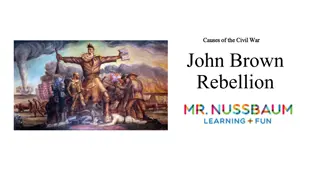The Civil War: Causes, Advantages, and Impact
The American Civil War was ignited by South Carolina's secession in 1860, leading to conflict over slavery and states' rights. President Lincoln fought to preserve the Union, not abolish slavery. The war saw economic developments like the Homestead Act and Morrill Land Grant, along with increased tariffs and railroad subsidies. Conscription and executive powers expanded, as seen in the NYC Draft Riots.
Download Presentation

Please find below an Image/Link to download the presentation.
The content on the website is provided AS IS for your information and personal use only. It may not be sold, licensed, or shared on other websites without obtaining consent from the author.If you encounter any issues during the download, it is possible that the publisher has removed the file from their server.
You are allowed to download the files provided on this website for personal or commercial use, subject to the condition that they are used lawfully. All files are the property of their respective owners.
The content on the website is provided AS IS for your information and personal use only. It may not be sold, licensed, or shared on other websites without obtaining consent from the author.
E N D
Presentation Transcript
www.Apushreview.com The Civil War
December 20, 1860 South Carolina convention voted to secede 6 others followed by March 4, 1861 Buchanan did little to stop secession in his lame-duck period Crittenden Compromise: Proposed new Constitutional Amendments: Guarantee slavery where it was; re-establish MO Compromise line in all US territory (where it was in 1860 and the future) Republicans (Lincoln) did not support the plan A key part of their platform was the non-extension of slavery Fort Sumter: Confederate leaders ordered the capture of the fort (SC) April 12, firing began, on the 14th, the fort surrendered As Lincoln mobilized for war, 4 more southern states withdrew 4 slave states remained in the Union (Border States): Maryland, Delaware, Kentucky, and Missouri Note: at the beginning of the war, Lincoln fought to preserve the union, NOT TO END SLAVERY File:ElectoralCollege1860.svg
Northern Advantages: Larger population (2 times as much as the South) More industry and war production Advanced transportation system Southern Advantages: Fighting a defensive war (knew land better) Most of white population was united Better military leadership Both the North and South mobilized their economies to fight the war
Economics during the war: Homestead Act (1862) provided 160 acres of land for settlers to move west for a small fee after 5 years Morrill Land Grant (1862) federal land was given to states to use for financing education Led to new colleges and universities (Cornell) Tariffs were raised to highest level in history to that point Republicans dominated Congress, wanted to Raise tariff rates Railroad subsidies for transcontinental railroad Union Pacific and Central Pacific met in 1869 National Bank Acts banks could join and issue treasury notes How did the country finance the war?
Conscription: Congress instituted a draft Wealthy individuals could hire substitutes for $300 The Civil War was seen as a rich man s war, but a poor man s fight. NYC Draft Riots: 100 + deaths over 4 day span Executive power during the war increased drastically: Lincoln sent troops into battle and increased military size without Congressional approval Suspended habeas corpus (only Congress can) and shut down newspapers in Maryland Election of 1864: Lincoln v. George McClellan (former Union general) Lincoln won electoral vote in landslide, close popular vote
File:Emancipation proclamation.jpg Early Emancipation: Confiscation Act (1861) slaves used in Southern military effort would be considered free 1862 law abolished slavery in DC Confiscation Act (1862) president could use freed slaves as soldiers Emancipation Proclamation: Executive order to free all slaves in areas of the Confederacy that were in rebellion Did NOT include areas under Union control nor the border states Changed the war effort to end slavery in addition to preserving the Union Helped keep Europeans from siding on behalf of the South
African Americans during the war: Escaped slaves were considered Contraband and would not be returned Black enlistment increased post-Emancipation Proclamation 54th Infantry black soldiers that fought for the North Glory Unfortunately, black soldiers were paid less and often did arduous manual labor Women and the War: Most women entered nursing National Women s Loyal League (1863) Founded by Elizabeth Cady Stanton and Susan B. Anthony hoped to eliminate slavery and gain women s suffrage
Government of the Confederacy: Most power resided in states President Jefferson Davis, Vice-President Alexander Stephens Confederate Economics: No uniform currency system led to high inflation 9,000% during the war! The Confederate government authorized the impressment of slaves and a food draft The role of Southern women changed drastically: Wives were put in charge of farming as husbands fought Widowed women had to find jobs to support themselves and families
The South had better military leadership than the North Ulysses S. Grant was not in charge of the war effort until March 1864 Northern navy was vastly superior to the Southern navy North blockaded the South Navy aided in transportation of supplies and troops
618,000 American died in the war Key Battles: Antietam: Bloodiest day of the war, led to Emancipation Proclamation Gettysburg: July 1-3, 1863, led to the . Gettysburg Address: Issued on November 19, 1863 Dedicated the battlefield as a cemetery Referenced the Declaration of Independence 4 score and 7 years ago (87 years ago) we here highly resolve that these dead shall not have died in vain that this nation, under God, shall have a new birth of freedom and that government of the people, by the people, for the people, shall not perish from the earth. Sherman s March to the Sea: Destroyed land and supplies of the South War is Hell Appomattox Courthouse: Surrender of General Lee on April 9, 1865
Subscribe to my channel Press the Like button Questions? Comments? Leave in comments


![❤[PDF]⚡ Civil War Talks: Further Reminiscences of George S. Bernard and His Fel](/thumb/20551/pdf-civil-war-talks-further-reminiscences-of-george-s-bernard-and-his-fel.jpg)




















